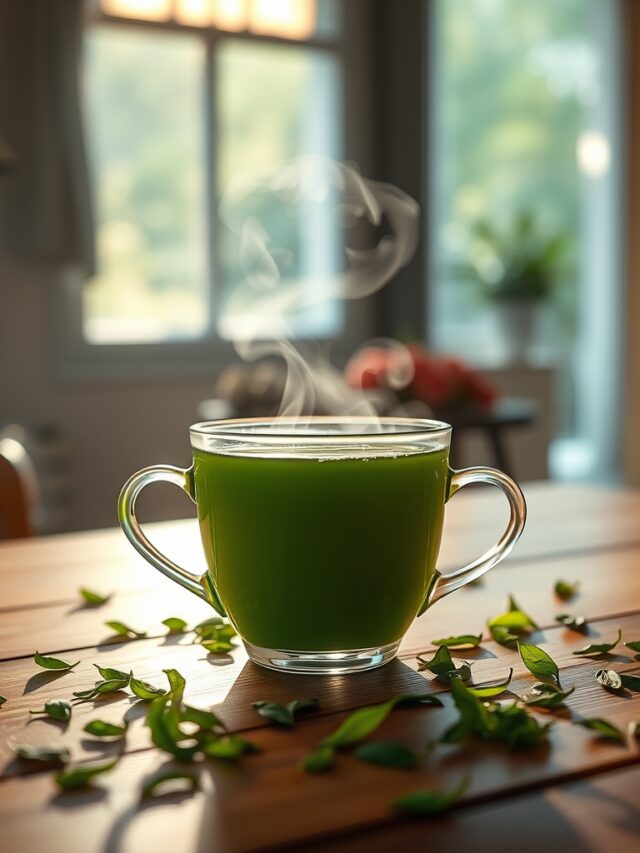For thousands of years, a simple cup of green tea has been more than just a beverage; it has served as a ritual, a medicine, and a cultural cornerstone. Today, modern science is beginning to validate this ancient wisdom, uncovering a remarkable array of green tea benefits that impact nearly every aspect of human health. This article demystifies the science behind this powerful elixir, exploring the profound green tea health benefits and, just as importantly, clarifying who should not drink green tea as part of their daily routine.
Table of Contents
Our goal is to provide a clear, evidence-based look at why green tea is good for you. We will examine everything from its antioxidant power to its role in weight management, offering a complete picture of this celebrated drink. Understanding both the advantages and the potential risks is key to incorporating it into your life safely and effectively.
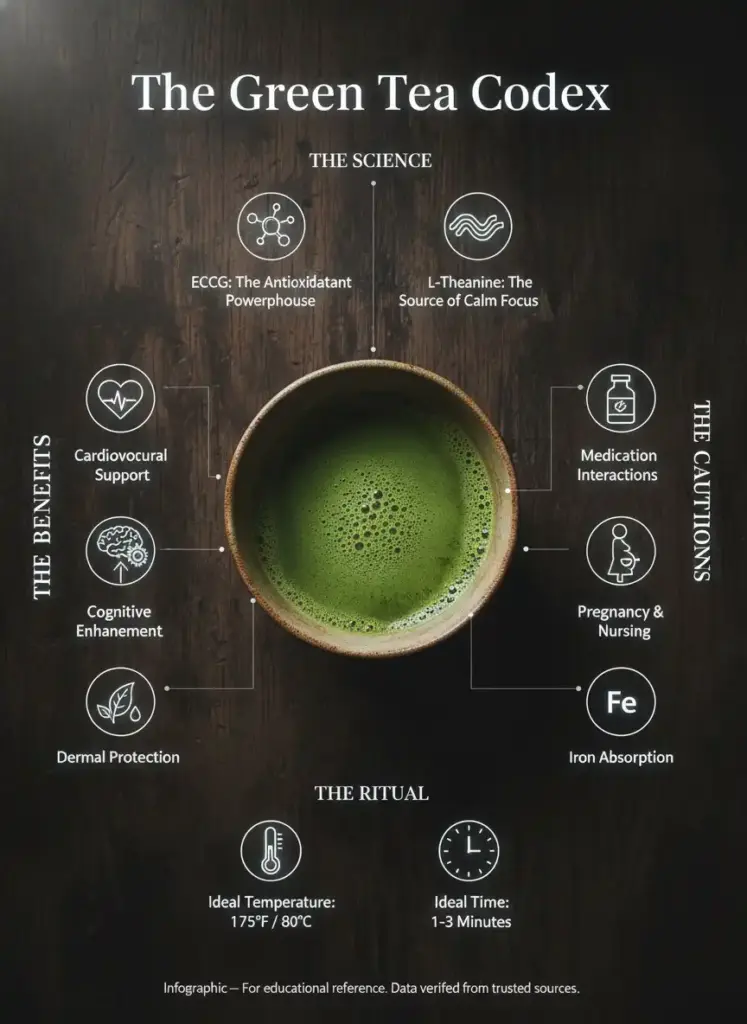
The Science Behind the Sip: Core Components and Mechanisms
The secret to green tea’s remarkable properties lies in its unique biochemical makeup. Unlike black or oolong teas, green tea is unoxidized, a process that preserves its rich concentration of powerful natural compounds. The most significant of these are polyphenols, which are responsible for many of the core green tea health benefits.
Why Polyphenols and Catechins Are So Important
Polyphenols are a class of plant-based compounds that act as potent antioxidants. The primary polyphenols in green tea are flavonoids, and within that group, the most crucial are catechins.
- Epigallocatechin Gallate (EGCG): This is the star of the show. EGCG is the most abundant and powerful catechin in green tea, and it is the subject of extensive scientific research. The catechins in green tea benefits are largely attributed to the actions of EGCG.
- Other Catechins: While EGCG gets most of the attention, other catechins like epicatechin (EC) and epigallocatechin (EGC) also contribute to the overall antioxidant profile. The synergy of these compounds is what makes green tea so effective.

How These Compounds Work in Your Body
The antioxidants in green tea function by combating oxidative stress. This is a process where unstable molecules called free radicals damage cells, contributing to aging and various chronic diseases. The polyphenols in green tea benefits come from their ability to neutralize these free radicals, protecting your body at a cellular level.
Beyond this, these compounds have anti-inflammatory effects, helping to calm systemic inflammation that is often a precursor to illness. This dual action of fighting oxidative stress and reducing inflammation underpins many of the scientifically proven green tea benefits.
The Role of L-Theanine and Caffeine
Green tea also contains L-theanine, an amino acid that has a calming effect on the brain. It promotes relaxation and focus without causing drowsiness. This is why green tea is good for you when you need sustained mental clarity.
The green tea caffeine content is lower than that of coffee, providing a gentle energy lift. The combination of L-theanine and caffeine creates a state of calm alertness, answering the question, “Can green tea give you energy?” with a resounding yes, but without the jittery side effects some experience with coffee. This unique synergy is a key reason many people prefer it for productivity.
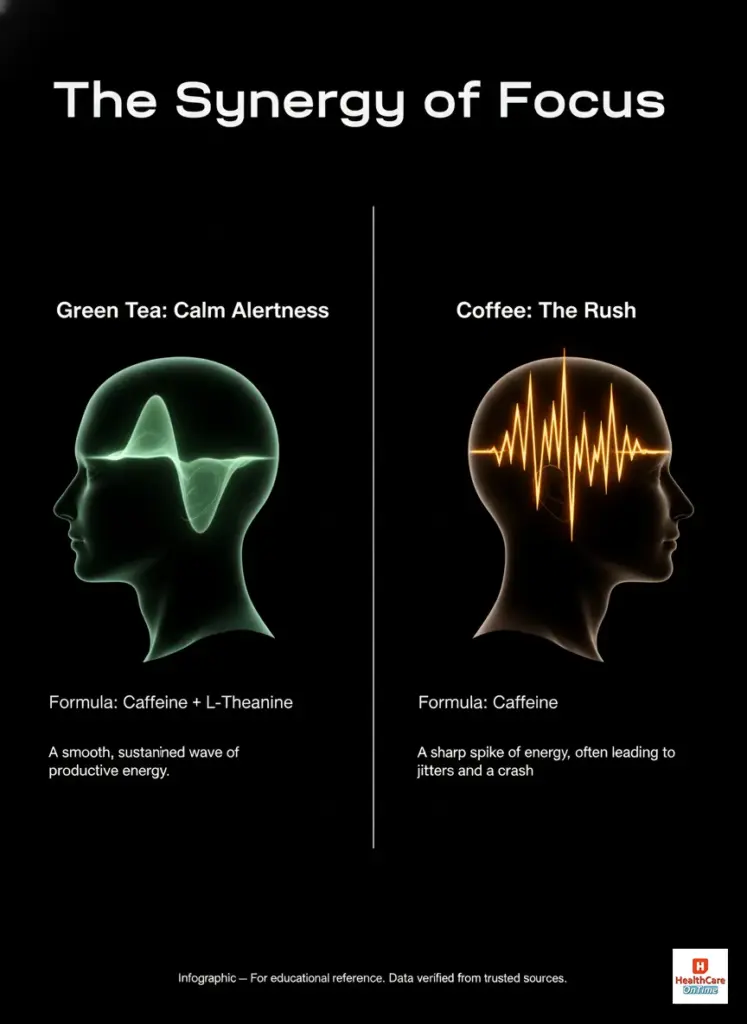
Deep Dive into Scientifically Proven Green Tea Benefits
Decades of research have moved the conversation about green tea benefits from anecdotal evidence to scientific fact. Let’s explore some of the most well-documented advantages of incorporating this beverage into your daily life.
Heart Health and Cardiovascular Wellness
One of the most significant green tea health benefits relates to the cardiovascular system. Regular consumption has been linked to improved markers of heart health. Studies show that the catechins in green tea can help lower LDL (bad) cholesterol and triglycerides.
This is a critical green tea benefit for heart health, as high cholesterol is a major risk factor for heart disease. Furthermore, the antioxidants in green tea help improve the function of the endothelium, the thin lining of our blood vessels, which plays a key role in regulating blood pressure.
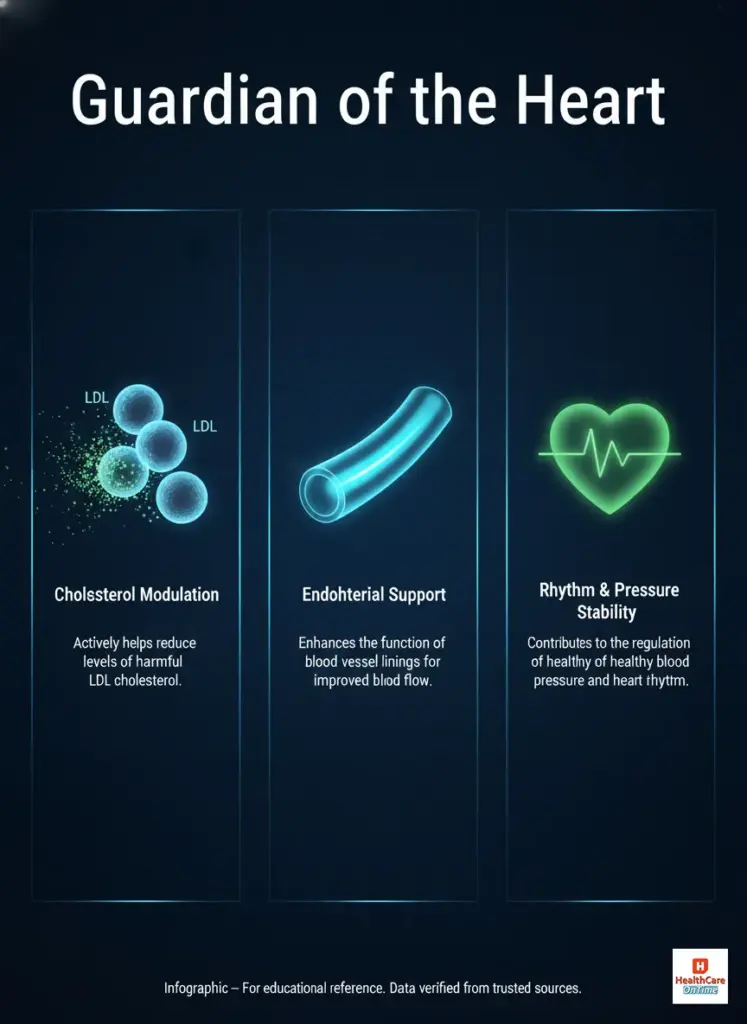
Weight Management and Metabolic Health
The connection between green tea for weight loss is one of its most popular benefits. The catechins, particularly EGCG, are believed to boost metabolism through a process called thermogenesis, where the body burns more calories to produce heat.
Understanding how green tea helps with weight loss involves recognizing its ability to increase fat oxidation, meaning it encourages the body to use stored fat for energy. While not a magic bullet, consistent consumption can be a valuable tool in a healthy weight management plan. This is a key reason why green tea is good for you if you’re focused on metabolic health.

Brain Function and Cognitive Enhancement
The synergistic effect of L-theanine and caffeine offers profound green tea benefits for cognitive function. It can improve alertness, reaction time, and memory. The unique combination promotes a state of calm focus that enhances productivity and mental clarity.
Beyond the short-term boost, research suggests long-term neuroprotective effects. The antioxidants in green tea may help protect brain cells from age-related damage, potentially reducing the risk of neurodegenerative diseases. This makes green tea for mental clarity a smart choice for long-term brain health.
Skin Health and Anti-Aging Properties
The powerful antioxidants in green tea also extend their protection to your body’s largest organ: your skin. These compounds help shield skin cells from damage caused by UV radiation and environmental pollutants, which are primary drivers of premature aging.
The green tea health benefits for skin include reduced inflammation, which can help with conditions like acne and rosacea. Whether consumed or applied topically, green tea for skin can contribute to a healthier, more resilient complexion.

Blood Sugar Regulation and Diabetes Risk
Emerging research highlights another critical green tea health benefit: its role in blood sugar control. Some studies suggest that green tea can improve insulin sensitivity and reduce blood sugar levels.
This potential green tea and diabetes prevention link is significant. By helping to regulate the body’s response to sugar, green tea can be a beneficial part of a diet aimed at preventing or managing type 2 diabetes. The polyphenols in green tea benefits play a crucial role here.
Ongoing Research: Cancer, Gut Health, and Immunity
Scientists continue to explore other potential green tea benefits. While more research is needed, early studies suggest that the high concentration of catechins may interfere with the growth of certain cancer cells. This is a promising area of green tea and cancer research.
Additionally, the compounds in green tea may positively influence the gut microbiome, supporting the growth of beneficial bacteria, which contributes to overall green tea and gut health. This, in turn, can bolster the immune system, making green tea for immunity another valuable attribute.
Enhancing Your Green Tea Experience: Additives and Types
You can amplify the already impressive green tea benefits by adding certain ingredients or choosing specific types of tea. Knowing how to prepare it can unlock even more of its potential.
Green Tea with Lemon, Turmeric, or Cinnamon
Adding a simple slice of lemon does more than just add flavor. The lemon in green tea benefits are rooted in science; the vitamin C in lemon has been shown to increase the absorption of catechins by the body. This makes your cup of green tea even more potent.
Similarly, combining green tea with turmeric adds the powerful anti-inflammatory compound curcumin into the mix, creating a synergistic effect that can help reduce systemic inflammation. Adding a stick of green tea with cinnamon can also enhance its antioxidant properties and may offer further support for blood sugar regulation.
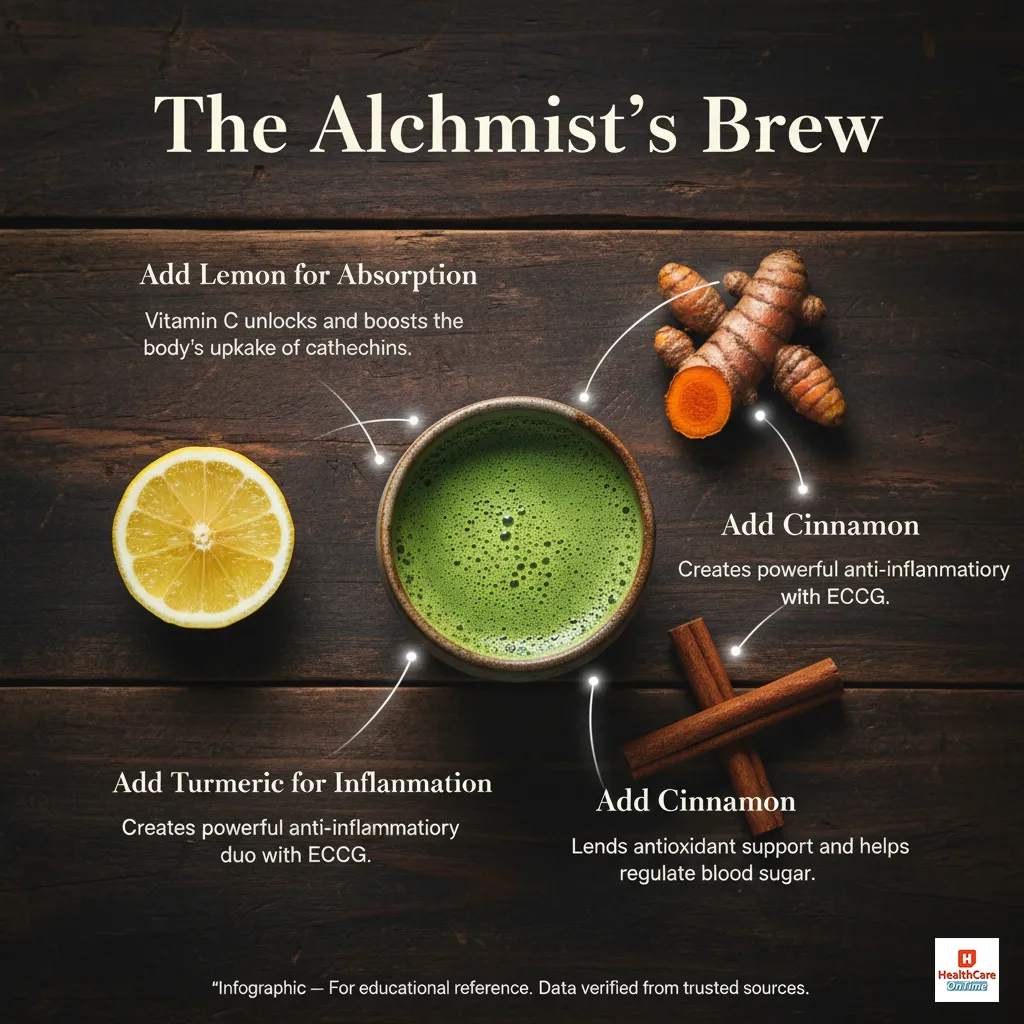
What is the Best Time to Drink Green Tea?
The best time to drink green tea depends on your goals.
- For Energy and Focus: Drink it in the morning or early afternoon to take advantage of its gentle caffeine boost and L-theanine.
- For Metabolism: Consuming it before a workout may enhance fat-burning effects.
- Between Meals: To maximize nutrient absorption and avoid interference with iron intake.
While some wonder about the benefits of green tea before bed, it’s generally not recommended due to its caffeine content. If you enjoy a warm beverage at night, opt for a decaffeinated version to avoid disrupting your sleep.
Which Green Tea is Best to Drink?
There are many green tea types, each with a unique flavor profile and subtle differences in composition.
- Sencha: The most popular type in Japan, known for its grassy, slightly sweet flavor. Sencha benefits are representative of most high-quality green teas.
- Matcha: A finely ground powder of specially grown green tea leaves. Because you consume the whole leaf, it has a much higher concentration of antioxidants and L-theanine.
- Gyokuro: A shade-grown tea with a sweeter, less astringent flavor and higher L-theanine content. Gyokuro benefits are particularly prized for promoting calm focus.
- Bancha: A more mature-leaf tea with a robust flavor and lower caffeine content.
Ultimately, the answer to “which green tea is best to drink?” is the one you enjoy and will drink consistently.
Decoding Green Tea Differences: Green Tea vs. Its Cousins
Understanding how green tea compares to other popular beverages can help you make informed choices for your health. The key difference lies in the processing, which dramatically alters the chemical composition.
Green Tea vs. Black Tea
Both green and black tea come from the same plant, but black tea is fully oxidized, which turns the leaves dark and changes their chemical structure. This process reduces the amount of EGCG. While black tea still has health benefits, the benefits of green tea vs black tea often center on green tea’s superior antioxidant profile due to its minimal processing.
Green Tea vs. Matcha
Matcha is a special form of green tea. The leaves are shade-grown for several weeks before harvest, which increases their chlorophyll and L-theanine content. After harvesting, they are steamed, dried, and stone-ground into a fine powder.
The key difference in green tea vs matcha is that with matcha, you consume the entire leaf, not just an infusion. This results in a much higher concentration of catechins, L-theanine, and other nutrients, making it a more potent source of green tea benefits.
Comparison of Popular Teas and Coffee
| Feature | Green Tea | Black Tea | Matcha | Oolong Tea | Coffee |
| Oxidation Level | Minimal (unoxidized) | Fully oxidized | Unoxidized (shade-grown, powdered) | Partially oxidized (20-80%) | Not a tea (roasted beans) |
| Key Compounds | High Catechins (EGCG), L-Theanine | Theaflavins, Thearubigins | Very High EGCG, L-Theanine | Catechins, Theaflavins | Caffeine, Chlorogenic Acids |
| Caffeine Content | Moderate (25-50mg/cup) | High (40-70mg/cup) | Very High (60-80mg/cup) | Moderate (30-50mg/cup) | Very High (95mg+/cup) |
| Flavor Profile | Grassy, vegetal, sometimes nutty | Malty, robust, sometimes fruity | Umami, sweet, creamy, vegetal | Floral, fruity, toasty, grassy | Bitter, acidic, earthy, nutty |
| Preparation | Steeping leaves | Steeping leaves | Whisked powder in water | Steeping leaves | Brewing ground beans |
| Common Benefits | Heart health, metabolism, brain, skin | Heart health, digestion, alertness | Enhanced focus, high antioxidants, detox | Metabolism, heart health, digestion | Alertness, focus, energy |
| Absorption | Good, enhanced by Vitamin C | Good | Excellent (whole leaf consumed) | Good | Rapid |
The discussion of oolong vs green tea is nuanced, as oolong’s partial oxidation places it somewhere between green and black tea in terms of both flavor and chemical composition. When comparing green tea vs coffee weight loss, green tea often has a slight edge due to the metabolic effects of its catechins.
Navigating Caution: Who Should Avoid Green Tea Daily?
For most people, the answer to “is it healthy to drink green tea everyday?” is a clear yes. However, it’s not suitable for everyone, and it’s essential to understand who should not drink green tea or should consume it with caution. The side effects of green tea are generally mild but can be significant for certain individuals.
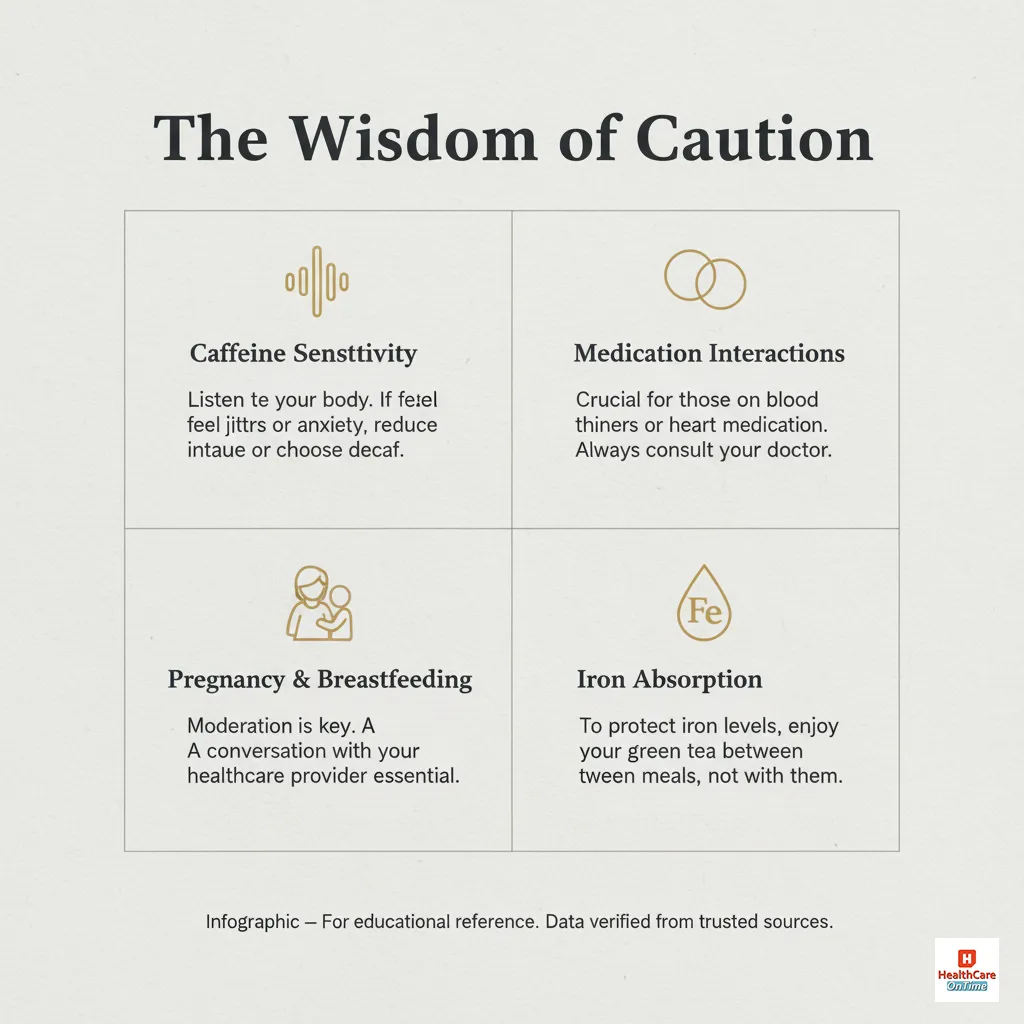
Individuals with Caffeine Sensitivity
While the green tea caffeine content is moderate, it can still cause issues for those highly sensitive to caffeine. Symptoms may include anxiety, heart palpitations, sleep disturbances, or irritability. If you are sensitive, consider decaf green tea benefits or limit your intake.
Those with Iron Deficiency Anemia
Green tea contains tannins, compounds that can bind to non-heme iron (the type found in plant-based foods) and reduce its absorption in the digestive tract. This is a crucial reason why green tea is bad for you if you are anemic or at risk of iron deficiency. To mitigate this, drink green tea between meals rather than with them.
Pregnant or Breastfeeding Women
Health authorities generally advise pregnant or breastfeeding women to limit their caffeine intake. Due to its caffeine content and potential to affect folate absorption, moderation is key. It’s always best to consult with a healthcare provider about safe consumption levels during this time.
People on Certain Medications
Green tea can interact with a range of medications. This is a critical consideration for who should not drink green tea.
- Blood Thinners (e.g., Warfarin): Green tea contains vitamin K, which can counteract the effects of these drugs.
- Stimulants: Combining green tea with stimulant medications can increase heart rate and blood pressure.
- Certain Heart and Blood Pressure Medications: Interactions are possible.
Always discuss your green tea consumption with your doctor or pharmacist if you are taking any prescription medications.
Individuals with Liver Conditions
Extremely high doses of green tea extract benefits from supplements have been linked in rare cases to liver problems. This is generally not a concern with brewed tea, but it highlights why unregulated, high-potency supplements should be approached with caution. The side effects of green tea long term are minimal when consumed as a beverage but can be more pronounced with extracts.
Practical Strategies for Optimal Green Tea Consumption
To maximize the green tea benefits and enjoy it safely, follow a few simple guidelines.
How Much Green Tea Per Day is Safe and Effective?
The question of how much green tea per day to drink is common. Most research suggests that 2 to 3 cups per day is an optimal amount to reap the health benefits without consuming excessive caffeine. Answering how many green tea a day is safe depends on individual tolerance, but exceeding 5 cups may increase the risk of side effects for some.
The Best Way to Prepare Green Tea for Health
Proper preparation is key. Using boiling water can scorch the delicate leaves, resulting in a bitter taste and destroying some of the beneficial catechins.
| Tea Type | Water Temperature | Steeping Time | Flavor Profile |
| Sencha | 160-175°F (71-79°C) | 1-2 minutes | Grassy, vegetal, slightly savory (umami) |
| Gyokuro | 122-140°F (50-60°C) | 2-3 minutes | Sweet, umami-rich, with a thick texture |
| Matcha | 175°F (80°C) | Whisk until frothy | Creamy, rich umami, with a sweet finish |
| Bancha | 175-185°F (80-85°C) | 2-3 minutes | Toasty, robust, with lower astringency |
Following this guide on how to prepare green tea for health will ensure you get the best flavor and the most potent green tea health benefits.

Choosing the Best Quality Green Tea
When possible, opt for high-quality, loose-leaf tea over tea bags, as it often contains superior leaves and fewer broken pieces. Look for reputable and transparent best green tea brands that specify the origin and type of tea.
Summary & Key Takeaways
The evidence is clear: the green tea benefits are extensive and scientifically supported, making it one of the healthiest beverages you can consume. From protecting your heart and brain to aiding in weight management and enhancing skin health, its powerful antioxidant profile provides a wealth of advantages.
However, mindful consumption is paramount. Understanding who should not drink green tea due to caffeine sensitivity, medical conditions, or medication interactions is crucial for safety. By following proper brewing techniques and consuming it in moderation, you can easily and safely make the profound green tea health benefits a part of your wellness journey.
Frequently Asked Questions (FAQs)
Is drinking green tea every day good or bad?
For most people, drinking green tea every day is very good. It is packed with antioxidants and has been linked to numerous health benefits. Generally, 2-3 cups per day is considered a healthy and beneficial amount.
Who should avoid green tea—are there any health risks?
Individuals with severe caffeine sensitivity, iron-deficiency anemia, and those on certain medications like blood thinners should avoid or limit green tea. Pregnant women and people with specific medical conditions should consult their doctor.
What are the scientifically proven benefits of green tea?
Scientifically proven benefits include improved heart health by lowering cholesterol, enhanced brain function and focus, boosted metabolism for weight management, and protective effects for the skin due to its high antioxidant content.
Can green tea replace coffee for energy?
Yes, for many people it can. Green tea provides a milder, more stable energy boost without the “jitters” or crash associated with coffee, thanks to the combination of caffeine and the calming amino acid L-theanine.
How long does it take to see the effects of green tea?
Short-term effects like improved focus can be felt within an hour. Long-term health benefits, such as changes in cholesterol or weight, may take several months of consistent daily consumption to become noticeable.
What’s the best way to prepare green tea for health?
The best way is to use hot, but not boiling, water (around 160-180°F or 70-80°C) and steep the leaves for 1-3 minutes. This preserves the beneficial catechins and prevents a bitter taste.
Does adding lemon or turmeric to green tea increase its benefits?
Yes. Adding lemon increases the absorption of catechins due to its vitamin C content. Adding turmeric provides additional anti-inflammatory benefits from its active compound, curcumin.
Can green tea cause side effects or interact with medications?
Yes. Common side effects, usually from excessive intake, include insomnia, anxiety, and stomach upset due to caffeine. It can interact with blood thinners, stimulants, and some heart medications.
Which brands or types of green tea are healthiest?
Matcha is often considered the healthiest because you consume the entire leaf. However, high-quality Japanese green teas like Sencha and Gyokuro are also excellent choices. Look for organic and reputable brands for the best quality.
What’s the difference between green tea and matcha?
Matcha is a powdered form of specially grown green tea. The main difference is that with matcha you ingest the whole leaf, resulting in a much higher concentration of antioxidants, L-theanine, and other nutrients compared to brewed green tea.
What are the specific long-term health benefits of green tea, particularly for heart health and diabetes?
Long-term, consistent green tea consumption is linked to a reduced risk of heart disease by improving cholesterol levels and blood vessel function. For diabetes, it may help improve insulin sensitivity and manage blood sugar levels, lowering the risk of developing type 2 diabetes.
Are there any specific green tea types that offer unique benefits?
Yes. While all green teas are healthy, some have unique profiles. Gyokuro, for example, is higher in L-theanine, making it excellent for promoting calm focus. Matcha offers the highest overall antioxidant concentration.


